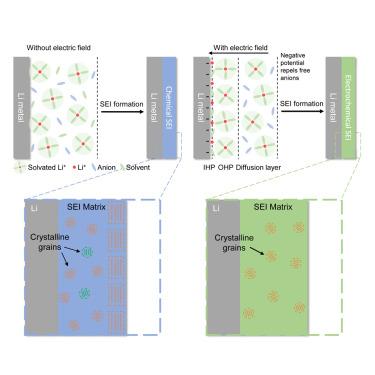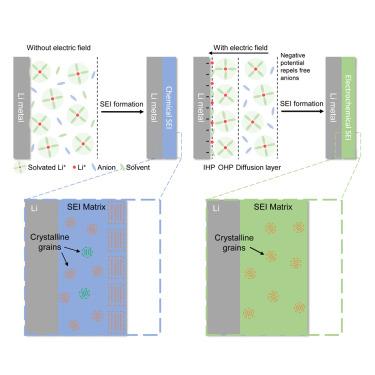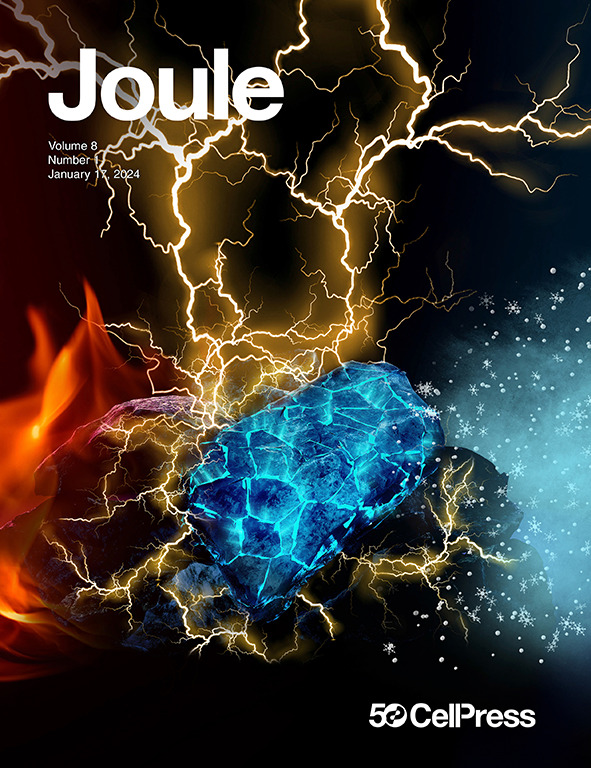Engineering battery corrosion films by tuning electrical double layer composition
IF 38.6
1区 材料科学
Q1 CHEMISTRY, PHYSICAL
引用次数: 0
Abstract
Battery performance is strongly influenced by the solid electrolyte interphase (SEI) that forms from electrolyte decomposition and remains a key target for engineering design. Whereas traditional approaches to tune the SEI have focused on electrolyte chemistry, we show that manipulating the electric field offers a novel approach. Here, we change the electrical double layer (EDL) composition by either applying or removing the local electric field, which directly controls SEI formation. Surprisingly, the solvent-derived SEI known to form in a conventional electrolyte exhibits anion-enhanced chemistry when the electric field is removed, which is attributed to the Coulombic interaction between the electric field and free anions. With the electric field control, we produce an anion-enhanced SEI in conventional electrolytes that demonstrates improved battery cycling and corrosion resistance. Together, our findings highlight the importance of EDL composition and demonstrate electric field strength as a new parameter to tune SEI structure and chemistry.


通过调整双电层成分实现电池腐蚀膜工程化
电池性能受电解质分解形成的固态电解质间相(SEI)的影响很大,这仍然是工程设计的一个关键目标。调整 SEI 的传统方法侧重于电解质化学,而我们的研究表明,操纵电场提供了一种新方法。在这里,我们通过施加或消除局部电场来改变电双层(EDL)的组成,从而直接控制 SEI 的形成。令人惊讶的是,当电场被移除时,已知在传统电解质中形成的溶剂衍生 SEI 会表现出阴离子增强化学反应,这归因于电场与游离阴离子之间的库仑相互作用。通过电场控制,我们在传统电解质中产生了阴离子增强型 SEI,从而改善了电池的循环性和耐腐蚀性。总之,我们的研究结果凸显了 EDL 成分的重要性,并证明电场强度是调整 SEI 结构和化学性质的新参数。
本文章由计算机程序翻译,如有差异,请以英文原文为准。
求助全文
约1分钟内获得全文
求助全文
来源期刊

Joule
Energy-General Energy
CiteScore
53.10
自引率
2.00%
发文量
198
期刊介绍:
Joule is a sister journal to Cell that focuses on research, analysis, and ideas related to sustainable energy. It aims to address the global challenge of the need for more sustainable energy solutions. Joule is a forward-looking journal that bridges disciplines and scales of energy research. It connects researchers and analysts working on scientific, technical, economic, policy, and social challenges related to sustainable energy. The journal covers a wide range of energy research, from fundamental laboratory studies on energy conversion and storage to global-level analysis. Joule aims to highlight and amplify the implications, challenges, and opportunities of novel energy research for different groups in the field.
 求助内容:
求助内容: 应助结果提醒方式:
应助结果提醒方式:


